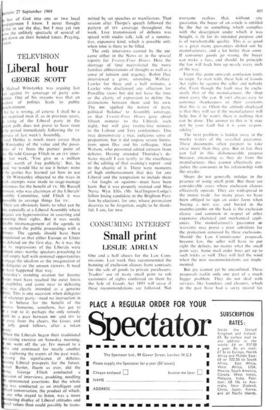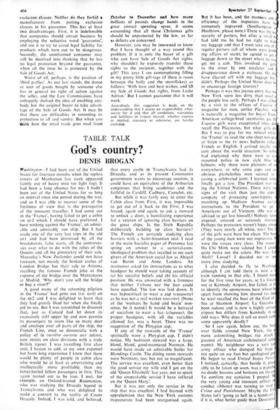CONSUMING INTEREST
Small print
LESLIE ADRIAN
One and a half cheers for the Law Com- missions. Last week they recommended the banning of exclusion clauses from contracts for the sale of goods to private purchasers. Traders' use of nasty small print to rob customers of rights conferred on them by the Sale of Goods Act 1893 will cease if these recommendations are followed. Not everyone realises that, without any guarantee, the buyer of an article is entitled by the Act to something which complies with the description under which it was bought, is fit for its intended purpose and is of merchantable quality. This is as good as a great many guarantees dished out by manufacturers, and a lot better than some. If consumer goods go wrong, the buyer can make a fuss, and should. In principle the law will back him up nearly every inch of the way.
From this point onwards confusion tends to reign. To start with, these Sale of Goods Act rights lie against the seller and nobody else. Even though the fault may be exclu- sively that of the manufacturer, the shop must carry the can. It isn't always easy to convince shopkeepers or their assistants that this is so. Often the attitude displayed is that they will see if the manufacturer will help, but if he won't, there is nothing that can be done. The answer to this is 'it may not be your fault but it is your respon- sibility'.
The next problem is hidden away in the murky waters of the so-called guarantee. These documents often purport to take away more than they give. But in law they can fail in this dishonourable purpose because, emanating as they do from the manufacturer, they cannot effectively pre- judice the consumer in his relationship with the retailer.
Shops do not generally indulge in the practice of using small print. But there are considerable areas where exclusion clauses effectively operate. They are widespread in the motor trade -for many years we have been obliged to sign an order form when buying a new car, and buried in the mumbo-jumbo on the back is the exclusion clause- --and common in respect of other expensive electrical and mechanical appli- ances. The manufacturer's guarantee or warranty may prove a poor substitute for the protection removed by these exclusions. Should the Law Commissions' proposals become law, the seller will have to put right the defects, no matter what the small print says. Some mail order boys get up to such tricks as well. They will feel the wind when the new recommendations are imple- mented.
But joy cannot yet be unconfined. These proposals tackle only one part of a much bigger problem. They do not deal with services, like laundries and cleaners, which in the past have had a sorry record for
exclusion clauses. Neither do they forbid a manufacturer from putting exclusion clauses in his guarantee. This has at least two disadvantages. First, it is indefensible that companies should attract business by employing the seductive word 'guarantee', and use it to try to avoid legal liability for products which turn out to be dangerous. Secondly, the uninformed consumer may still be deceived into thinking that he has no legal protection beyond the guarantee, when all the time he is protected by the Sale of Goods Act.
Worst of all, perhaps, is the position of 'third parties'. As our law stands, the donee or user of goods bought by someone else has in general no right of action against the seller, and the Law Commissions have unhappily shelved the idea of enabling any- body but the original buyer to take advan- tage of the Sale of Goods Act. It may be that there are difficulties in extending its protection to all and sundry. But when you think how the retail trade goes mad from pctober to December and how many millions of pounds change hands in the great annual spending spree, it seems astounding that all those Christmas gifts should be unprotected by the law, as far as defects are concerned.
However, you may be interested to know that I have thought of a way round this problem. If it is only the buyer of a gift who can have Sale of Goods Act rights, why shouldn't he expressly transfer those rights to the recipient, together with the gift? This year I am contemplating filling in my pretty little gift-tags (if there is room between the holly and the snowflakes) as follows: 'With love and best wishes, and-Ill my Sale of Goods Act rights, from Leslie Adrian.' But I cannot guarantee that it will work.
Accordingly, this suggestion is made on the understanding that I accept no responsibility what- soever for it and that all conditions, warranties and liabilities in respect thereof, whether express or implied, statutory or otherwise, are hereby excluded.







































 Previous page
Previous page